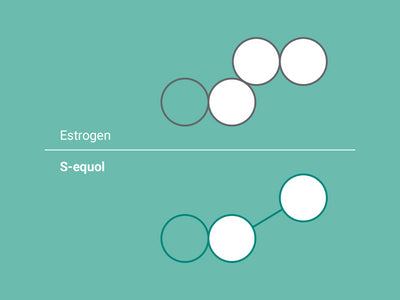
14 Surprising Facts Every Woman Should Know About Perimenopause
Much of what we often think are the first early menopause symptoms—hot flashes, mood swings, sleep disturbances, and vaginal dryness—are often actually perimenopause symptoms. Perimenopause is the span of time in which our ovaries gradually begin to make less estrogen leading up to the day that marks one full year after our last period (menopause). But before that day comes, our bodies are already undergoing changes that will affect our long-term health. Educating ourselves and our loved ones now on what this change really means can help us continue living our best lives amidst this natural transition.
1. Perimenopause is the first stage of the menopause transition
There are three stages of menopause: perimenopause, menopause, and postmenopause. Perimenopause marks the beginning of this natural transition out of our reproductive years.1Learn more about the stages of menopause.
2. The first sign of perimenopause is an irregular menstrual cycle2
There are two stages of perimenopause, sometimes referred to as “early transition” and “late transition.”2 Cycles are mostly regular during the early transition, with only a few interruptions, but those interruptions extend for longer periods of time as women enter into the late transition.2 Estrogen levels fall and rise throughout perimenopause, and menstrual cycles may lengthen or shorten.3 There may be cycles in which you skip ovulation entirely because your ovaries don’t release an egg.3 If you’re experiencing irregular cycles in your 40s—or any of the common symptoms associated with menopause such as hot flashes, sleeping problems, or vaginal dryness—you may be in perimenopause.
3. Perimenopause usually lasts 3-4 years4
Perimenopause generally begins with irregular menstrual cycles and ends one full year after your last period.4 But the time over which this transition takes place can span one month to one decade, depending on the person.4 On average, however, perimenopause lasts 3–4 years.4
4. But it can begin as early as your mid-30s
Although most women enter into perimenopause in their 40s, some women notice symptoms as early as their mid-30s.3 Women can also enter into this stage of life early or prematurely due to certain cancer treatments or a hysterectomy.
5. Perimenopause symptoms are a result of decreasing estrogen
As we go through this transition, estrogen and progestin levels rise and fall.3 The changes many women feel during this time are a result of this gradual decline of estrogen in the body.3
Learn more about estrogen's role in your overall health.
6. Perimenopause symptoms vary between people and over time2
There are four hallmark symptoms of the menopausal transition: hot flashes, poor sleep, vaginal dryness, and adverse mood.2 But the intensity and duration of these symptoms vary greatly depending on a host of factors like ethnical backgrounds, body size, age, and lifestyle habits such as smoking.2
7. Certain factors may influence how early you enter perimenopause
While menopause itself is a natural process, certain factors may contribute to how early we enter into this stage of life. For example, menopause begins one to two years earlier in women who smoke versus women who don’t.3 A family history of early menopause can also impact how early you enter this stage.3 Certain cancer treatments and hysterectomies can trigger early menopause as well.3 It can help to talk to your doctor about your medical background and which factors are most relevant to your personal journey.
Here are 10 questions to ask your doctor about menopause.
8. Early perimenopause may affect how harsh your symptoms are
Women entering into early perimenopause experience many of the same symptoms, such as hot flashes, sleep disturbances, and vaginal dryness. But these women may also experience more intense symptoms and feel a greater need to seek treatment.1
9. Early perimenopause may also affect your long-term health
Estrogen is a powerful hormone that plays a role in supporting the health of many vital tissues and organs. Women who enter into early menopause spend a longer period of time without enjoying the health benefits of estrogen, which can put them at a greater risk of developing long-term complications.1
10. Symptoms are usually worse in the final years of perimenopause2
During the late transition leading up to one full year since a woman’s last menstrual cycle, symptoms seem to increase in both frequency and intensity.2 Women in the later stages of the menopausal transition were more likely to have major depression.2 Studies also show women with low levels of anxiety entering into menopause tend to become “highly anxious” as they progress through the transition.2 Certain symptoms don’t go away even after perimenopause ends. For example, while hot flashes and adverse moods tend to improve over time, symptoms like vaginal dryness and sleeping problems usually require some treatment before beginning to subside.2
11. Perimenopause symptoms may not require treatment
That said, perimenopause is a natural stage of life and may not require treatment. Some women may not experience any symptoms at all or experience only subtle, gradual changes. If your symptoms interfere with your lifestyle or wellbeing, perimenopause can be a good excuse to check in with your doctor and consider treatment options.
12. Lifestyle and dietary habits can help manage perimenopause symptoms
Exercise and a plant-based diet rich in vegetables and whole grains can go a long way when it comes to helping manage pesky symptoms.5 Other options may help as well, such as getting at least 1000–1200mg of calcium daily either from our diet or supplementation.5 If you’re one of the many women who experience hot flashes during this time, it can help to keep a journal of which foods or drinks trigger them. There are some medications that can help as well, including contraceptives, but it’s always a good idea to chat with your doctor to see which methods might be most effective for your specific needs.
Get some superfood recipes to help soothe your menopause transition.
13. Re-evaluating our mental and emotional state can help ease symptoms as well
Menopause is a whole-body experience, and while treating symptoms directly can help, there may also be some hidden stressors worth taking a look at too. Assessing your anxiety or depression levels, as well as any changes to your mood or memory, can help. Other habits that may help include allotting time for your personal needs amid all your other responsibilities, taking note of any emotional triggers, and seeking support from family, loved ones, or even your doctor.
14. There is no comprehensive list of symptoms
As tempting as it may be to simply grin and bear our symptoms until this time passes, the truth is we won’t really know what’s going on with our body until we take the time to listen to it. Perimenopause looks different for every woman, and there is still a lot of research left to be done.2 Thankfully, health care practitioners can help guide us toward the treatment options that are best suited to our needs, desires, and medical background. Learning more about ourselves during this transition may give us the knowledge we need to thrive, no matter what our bodies (or hormones) throw at us.
References
- The North American Menopause Society. “Perimenopause & Premature Menopause FAQS.” 2020. Accessed on: January 17, 2020. <https://www.menopause.org/for-women/expert-answers-to-frequently-asked-questions-about-menopause/perimenopause-premature-menopause-faqs>
- Santoro, N. Perimenopause: From Research to Practice. J Womens Health (Larchmt). 2016; 25(4): 332–339.
- Mayo Clinic. “Perimenopause.” 2019. Accessed on: January 17, 2020. <https://www.mayoclinic.org/diseases-conditions/perimenopause/symptoms-causes/syc-20354666>
- Harvard Medical School. “Perimenopause: Rocky road to menopause.” 2018. Harvard Health Publishing. Accessed on: January 17, 2020. <https://www.health.harvard.edu/womens-health/perimenopause-rocky-road-to-menopause>
- Cedars-Sinai. “Perimenopause.” 2020. Accessed on: January 17, 2020. <https://www.cedars-sinai.org/health-library/diseases-and-conditions/p/perimenopause.html>



